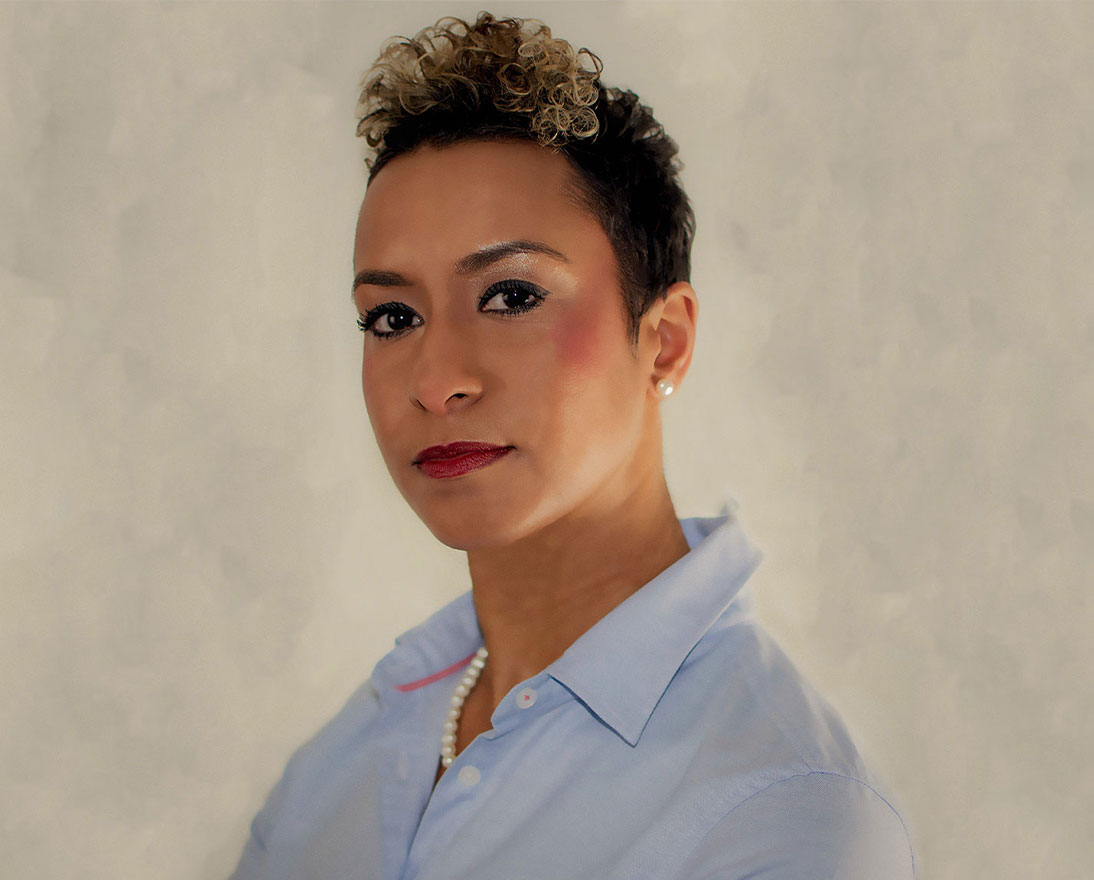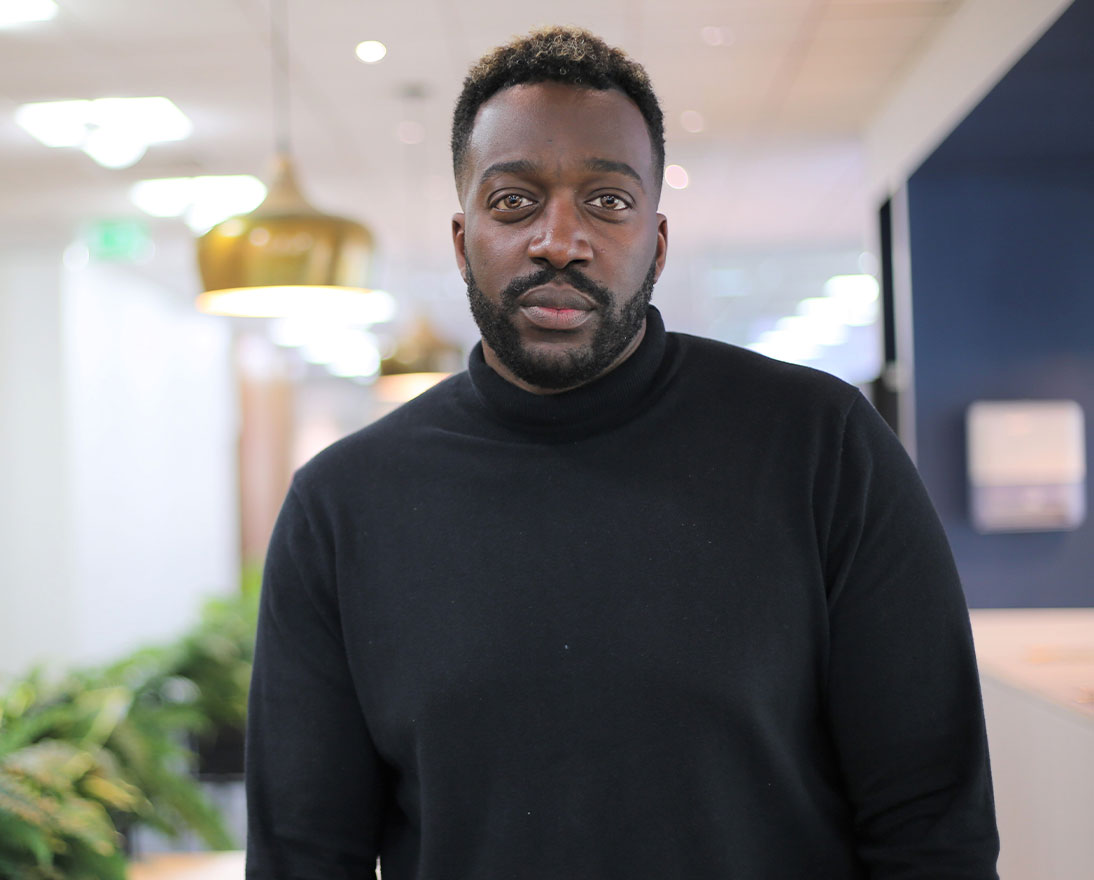
Black Voices: Life when you’re the ‘only one’
Sharon Robinson experienced “sheer hatred” as a 7-year-old, the start of a lifelong struggle with racism. Now she sees a real willingness for change and is encouraging inclusion in environments where she used to be the only Black person.
By Sean McAllister
“I was walking home from school with another classmate who was white. We were approaching her house and her mother was in the yard and saw us coming. I don’t have a recollection of her saying anything to me, but the expression on her face is something I will never forget.”
Sharon Robinson was just 7 years old but the events from that day would shape the rest of her life.
“You see images during the civil rights movement of schools being desegregated and there are faces of angry, screaming parents. That was the kind of hatred that was directed at me that day as a young girl.
“It was sheer hatred at seeing me with her daughter. I was old enough to understand what it meant. It was crystal clear. Experiences like that, from a very young age, taught me to live defensively in order to stay safe emotionally. To be cautious and braced for others’ prejudice and rejection.”
Sharon went to university and is today a very successful insurance executive as the Chief Pricing Actuary at Zurich North America. Because of this, Sharon says people are shocked to discover she has experienced racism in her life.
“Maybe they see my professional success and assume I haven’t been touched by racism. That’s completely wrong. Racism shows up everywhere, including the workplace, past and present. I overhear things that weren’t intended for me to hear. I’ve heard things highly offensive that were said directly in my presence by people totally ignorant of their own offensive beliefs.”
Sharon is from Wheaton, Illinois, which has a history of segregation. “My parents moved into our home in 1966 just as legalized housing segregation was coming to an end. But Wheaton was still very segregated, and Blacks only lived in a couple of neighborhoods,” recalls Sharon.
She grew up in a very close-knit Black community, just a few blocks wide. But she started to cross the lines of segregation when she went to a predominantly white school.
“I was typically one of two, at most three, Black children in the class. At home I was just one of the kids in the neighborhood, but at school I was the ‘other one’, the ‘different one’.
“This separateness creates tension. I was surrounded with a keen sense of where I did and did not belong. Once outside my own neighborhood, I was always one of only a few Blacks in a majority white world.
“That continued to be my experience throughout school and into the workplace and continues today. Constantly in settings that send messages that people like me are only acceptable one or two at a time.”
Sharon went on to study actuarial science at the University of Illinois and then entered the workplace. But her experience of being the ‘other one’, the ‘different one’, followed her.
“Social interactions with colleagues can be difficult. You go out for dinner or drinks after work and I’m always the ‘only one’. In those settings, people relax and say things that might not slip out in a formal business setting. It started almost immediately after starting my first job out of college.
“I was invited to join colleagues after work and a summer intern was joining us. She called her mother to tell her she would be home late, and we could clearly hear her trying to reassure her that she would be safe. Then I heard her say, ‘don’t worry mom, I’m not going out where the Black boys are’. We’re all standing there, half a dozen of us. And no one says anything. I don’t say anything. She hangs up the phone and says, ‘okay, I’m ready to go!’
“What do you do with that? I don’t know how to handle that situation. Do I call her out? Do I say, ‘ok everybody let’s sit and have a conversation about what just happened?’. No, you absorb it, and you just keep going.”
Nobody said anything
A similar situation happened at another workplace, but this time with her boss. “He invited the leadership team to his home for a BBQ following a broker event. Again, we’re in a social setting where people relax and drink. And again, I’m the ‘only one’. So, he tells a ‘funny story’ and describes a man in very derogatory language and calls him ‘Monkey Joe’. It disgusts me now just to even say that. This is my boss! What do you do? Call him out? Give him a lecture? Again, I just absorbed it and didn’t say anything. Nobody said anything.
“In his mind it’s a funny story. He doesn’t recognize there’s something wrong with it. Then your mind asks, what does he call me when I’m not around? What does he think of me? What would he think of my family if he met them? And I have to go back to work with him the next day.”
Sharon has encountered many similar situations throughout her life. “I’ve thankfully never experienced physical violence of any kind. I have, however, experienced the emotional trauma of racism with very deep and lasting impacts. There is no such thing as polite racism. It doesn’t just naturally bounce off me without leaving some residue.
“I have occasionally experienced hate. Bold, direct, clear race-based hatred; as a child and as an adult. But mostly what I experience is indifference, lack of understanding, lack of empathy, and denial. I think statements of being ‘color blind’ are extremely dangerous and offensive. It’s like telling me you’re ignoring who I am. Ignoring history. Ignoring the reality of my different life experiences. Pretending everything is the same for us when it isn’t.”
Despite having a good education and a very successful career, Sharon says she wonders how it would have been different if she didn’t have the stress and emotional baggage growing up. “What more might I have achieved? And then, who else couldn’t overcome that baggage and didn’t progress?”
Some of the racism Sharon has encountered has been more vile and personal, and it started as soon as she moved into her current home with her husband and sons – and continued off and on for years. The worst incident happened eight years ago, when someone or somebodies spray painted the N-word in the street in front of her house and a swastika in bright red on the snow in the lawn.
Sharon’s husband took their sons outside to see the abhorrent racist vandalism and to talk about it. “Instead of internalizing it as I would have done, their response was more, ‘some jerk did something stupid’. I’m glad they have been quicker to get to the point in their lives where they are able to realize ‘this is somebody else’s issue; this is not me’.”
Sharon’s response to racism is evolving. “More and more I’ve gotten to a place where I internalize less of what is other people’s ignorance. I know their beliefs have nothing to do with my value of who I am. But I do also get angry and I feel disappointed in people’s poor behavior.”
She believes much has changed since the murder of George Floyd – a 46-year-old Black man who died in Minneapolis when a white police officer knelt on his neck for 9 minutes and 29 seconds.
“When George Floyd was murdered and the video was shared across the country, it forced a very difficult and painful conversation that has opened doors. People are having to self-reflect, see themselves in this issue in a way they haven’t before,” observes Sharon.
People started approaching Sharon to understand more about her experience of racism and she has spoken at various corporate events. One of those was an annual actuarial meeting when in the aftermath of George Floyd’s death, she decided to change her presentation topic from pricing initiatives to diversity in the actuarial profession.
“I told them, I’m tired of being the only Black actuary at Zurich North America. Not that I’ve been the only one ever, but I’m the only one today. I challenged them and told them we can do better than this.”
Sharon was overwhelmed with the response. “People came up to me and said ‘Sharon, we want to do something too’. We’ve now created an Actuarial Diversity & Inclusion committee, we’re looking at hiring practices, creating a more inclusive environment, and the summer intern class is the most diverse group I’ve seen in my 12 years with Zurich.”
Sharon says she has been willing to share her story. “I want people to recognize that racism isn’t something distant. It’s all around, every day, everywhere. It’s right next to them. And some self-reflection might reveal where they’ve seen it show up or even participated in it and that they may harbor some of the prejudices that reinforce the racism.”
But educating people about racism has also been exhausting for her. “I relive some very unpleasant experiences and I put out some very personal, emotional memories, sometimes to have them not received with the empathy or understanding that I would have hoped for,” she says.
“I’ve also been hurt by some people that simply don’t understand, that deny the issues, that can’t or won’t see the perspective of people that are different to themselves.”
But her overriding feeling is one of optimism.
“It is extremely exciting for me to see that people want to do something, that people care. And I’ve been encouraged by the openness and desire to understand and stand with me and others in speaking out against racism and making a difference in workplace diversity and inclusion.
“But I want people to recognize that when they see or hear it, say something. Don’t tolerate it. Don’t brush it under the rug and leave it for someone else to deal with. That’s not being an ally.”


